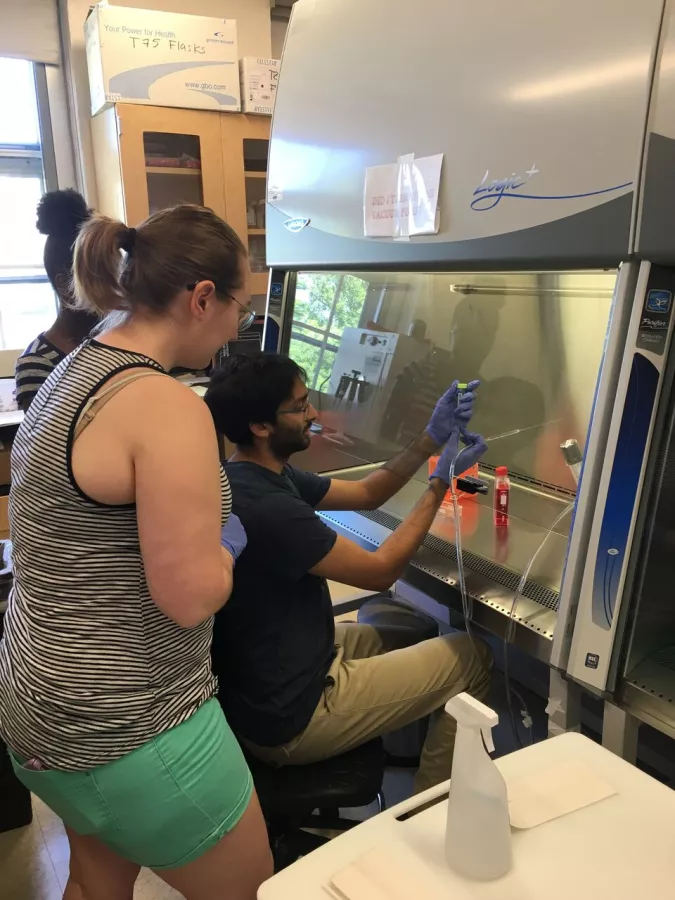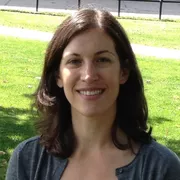Geneticist Dawn Carone Awarded $150,000 Grant to Research Uncontrolled Growth in Cancer Cells

Rajiv Potluri '20 (seated) works with human cancer cells in a biosafety cabinet in Assistant Professor of Biology Dawn Carone's lab with Emily Ferreri '19 and Jessica Malisa '19.
Assistant Professor of Biology Dawn Carone has received a $150,000 grant from the Charles E. Kaufman Foundation, boosting her research on causes of uncontrolled growth in cancer cells and deepening the experiences of five Swarthmore students in her lab.
The foundation, a supporting organization of The Pittsburgh Foundation, bestowed the grant for Carone’s project on “Locus-specific regulation of pericentric satellite sequences.” The funding is designed to empower promising scientists in Pennsylvania who shed new light in their fields and cross interdisciplinary boundaries.
“It’s a wonderful reward to hear that someone else believes that your ideas are worth investing in,” says Carone, who enters her second year at the College. “I’m so appreciative of the time the Foundation spent reviewing the grant, their vote of confidence in our work, and their support of innovative research within a small, liberal arts environment such as Swarthmore.”
With the Foundation’s support, Carone is confident she and her research team will make great strides in the understanding of the role that misregulation of pericentric satellite sequences may play in promoting uncontrolled growth in cancer cells.
“And of equal importance,” she adds, “this award will significantly contribute to the advancement of my career and research program as well as to the training of the next generation of scientists from Swarthmore.”
Among the students collaborating on the project this summer is Rajiv Potluri ’20, who lauds not just Carone’s scientific acumen but her mentoring skills.
“One of my biggest fears working in a molecular biology lab is that I would not be able to perform the experiments in an acceptable and timely manner, as I’ve always been slowest and most hesitant in my lab courses,” says Potluri, of Skillman, N.J. “But [Carone’s] patience and confidence in me allowed me to blossom, and I’m proud to say that I can perform the many different experiments required in the lab with ease.”

Assistant Professor of Biology Dawn Carone
“Working with Dawn is awesome,” adds Emily Ferrari ’19, a psychology and biology major from Strasburg, Pa. “She’s very knowledgeable and accomplished, but she’s also very patient and encouraging, which allows us to learn a lot and to take charge of our projects.
“Even though we work really hard,” she adds, ”[Carone] also emphasizes having fun and enjoying our work.”
The intent of Carone’s research is to contribute to the basic understanding of the structure and function of specific DNA sequences found near the centromeres of chromosomes — constricted regions to which spindle fibers attach, enabling duplicated chromosomes to segregate to opposite poles of a dividing cell. Despite the extensive sequencing of the human genome, she says, these sequences remain vastly unknown because of their highly repetitive nature.
The project will also engage promising undergraduate researchers in innovative genomics and cytological techniques, she says, training the students and propelling future careers in genomics and cancer research. It follows the paper Carone recently co-authored for Cell Reports and a U.S. patent she holds with colleagues (including Jeanne Lawrence, her postdoctoral mentor at University of Massachusetts Medical School) for detection of a novel biomarker in cancer.
The project traces back to Carone’s postdoctoral studies and fuses with concepts she explored in her Ph.D studies at the University of Connecticut, where she "actually studied chromosomes from wallabies and kangaroos!”
Charles Kaufman, a respected chemical engineer, left $40 million to The Pittsburgh Foundation when he died in 2010, to continue his life-long commitment to scientific research with the potential to improve human life. Since 2013, the Foundation has awarded 43 grants totaling $9.1 million.
This year, the Kaufman Foundation awarded eight grants, totaling $1.8 million, after receiving 250 letters of intent from 37 colleges and universities. The support comes at a time — the first in the post World War II era — when the federal government no longer funds a majority of basic research carried out in the U.S.
“With the current scientific climate being so dire, both for new and established investigators,” says Carone, “I’m especially appreciative of the philanthropic goals of the Kaufman Foundation, and their mission to support ‘the innovative pursuit of fundamental questions.’”
Swarthmore is investing in its vibrant intellectual culture. Learn how at lifechanging.swarthmore.edu.



